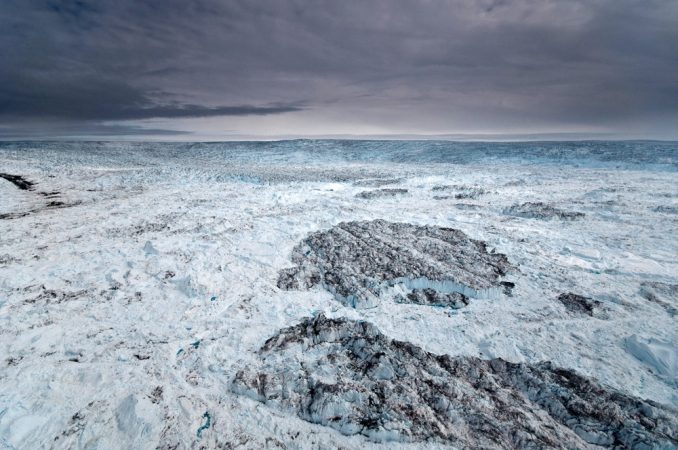Slowing ice flows
New satellite study of glacier motion shows stop-and-go ice movement

Greenland’s glaciers — giant, slow-moving rivers of ice — respond dramatically to changes in climate. As temperatures rise, glaciers melt. This adds water to the sea. But in a new study, scientists say that meltwater may not be pouring into the seas as fast as the earlier worst predictions had suggested.
Understanding glacier melt rates is important because the water released can contribute to rising ocean levels. And that sea-level rise may eventually swamp beaches and wipe out oceanfront buildings around the world.
Twila Moon is a glaciologist at the University of Washington. She worked on the new study. Glaciologists study the movement, makeup and impact of glaciers. The new study shows glaciers are reacting to climate change, Moon told Science News. Still, she notes, their impact might not be as bad as scientists had suspected.
“We’re certainly looking at significant rises in sea level, ” she told Science News. However, added, some of the worst-case scenarios that people imagined no longer seem likely.
In 2008, scientists reported that if every glacier in Greenland increased its speed tenfold, then global ocean levels might rise by about 150 centimeters (or about 1.6 feet) by the year 2100. If every glacier only doubled its speed (a more realistic change), then sea levels would rise 9 centimeters (about 3.5 inches) over that time.
Most of Greenland lies under a giant sheet of ice. Outlet glaciers carry ice from the sheet to the sea. Jakobshavn (YAH-kubs-HAAV-un) is a large glacier in Greenland that races toward the sea at just over 1.5 meters (roughly 5 feet) per hour. Moon and her colleagues studied satellite data collected between 2000 and 2010. It provided information on more than 200 outlet glaciers. Most glaciers sped up during this time period. But other glaciers moved at a constant speed. Still others slowed down during the decade, stopped or were just starting their trek to the sea.
Forecasting the future is difficult. And Moon pointed out that even a 10-year study is pretty short when it comes to glaciers. She doesn’t think the glaciers are on track to contribute 9 centimeters to the world’s oceans by 2100. However, she does think that the slower-moving glaciers could pick up speed again.
Glaciologist Leigh Stearns works at the University of Kansas in Lawrence. She did not work on the study. “We don’t know what caused the speed changes,” she said. “Neighboring glaciers are behaving very differently, and that’s confusing,” she told Science News. Clearly, she says, scientists still have a lot to learn about glacier movement.
POWER WORDS
glacier A slowly moving mass or river of ice.
climate change A long-term, significant change in the climate of Earth, usually seen as resulting from human activity.
ice sheet A permanent layer of ice covering an extensive area of land.
glaciology The study of glaciers.







